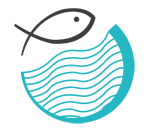
Deck the Table with Australian Seafood this Christmas
There’s no question of naughty or nice when it comes to Australian seafood— it’s always a winner.
“When you choose Australian seafood, you’re supporting one of the world’s most highly regulated and best-performing fisheries management systems,” said Seafood Industry Australia (SIA) CEO Veronica Papacosta. “This Christmas, whether you opt for farmed or wild-caught seafood, you can take pride in the incredible work of our fishers and aquaculturists, who ensure sustainability while delivering top-quality seafood for Australians to enjoy.”
Australian seafood has become a cherished Christmas tradition, and 2024 is no different. From fresh prawns and oysters to barramundi and rock lobster, there’s no shortage of sustainable, delicious options for your festive feast.
This year, however, brings new challenges. Conservation measures designed to protect marine biodiversity have reduced fishing access in some areas, increasing costs for fishers and potentially impacting seafood prices.
“With cost-of-living pressures in mind, we recommend planning ahead,” said Papacosta. “Speak with your fishmonger early about prices as demand and supply balance out closer to Christmas. You can also save by opting for raw seafood instead of pre-cooked, so consider throwing a shrimp on the Barbie!.”
Despite these challenges, there’s still an abundance of incredible Australian seafood to enjoy. Prawns remain a festive favourite. Australia is blessed with an abundance of different prawn species including King Prawns, Tiger Prawns and Banana Prawns, all offering exceptional quality and sustainability. Freshly shucked Sydney Rock and Pacific oysters are perfect for kicking off the celebrations, and for a show-stopping main course, consider whole roasted Barramundi, Tasmanian Atlantic Salmon, or go for the wow factor with a Western, Southern or Eastern Rock Lobster!
“By choosing Australian seafood, you’re not only getting premium, sustainable products—you’re also supporting hardworking local fishers and aquaculturists who bring the best from our oceans to your table,” Papacosta added.
For recipe inspiration, preparation tips, or to locate a local supplier, visit the Fish Finder tool at Greataustralianseafood.com.au.
This Christmas, make your celebrations truly special with fresh, local Australian seafood—sustainably sourced, beautifully prepared, and always delicious.
Media contact
Sarah Bakic
Seafood Industry Australia
Communications Manager

Australia’s united food and wine team heads to Taiwan
Leaders of some of Australia’s most prominent agriculture representative groups are focussing on Taiwan next month in a collaborative effort to increase export opportunities for Australia’s premium food and wine.
The Australian Food and Wine Collaboration Group, which includes Seafood Industry Australia along with Dairy Australia, Meat & Livestock Australia, Hort Innovation and Wine Australia, will hold a series of roundtable discussions, workshops and a gala dinner in Taipei on 11 November.
Seafood Industry Australia Trade Export Manager Laura Davies said Taiwan was regarded as stable and long-standing market for Australia’s exports, with a growing middle class and an increasing demand for premium safe produce.
“Taiwan has the third-highest discretionary, non-essential spending in the region, with approximately 25 per cent of the average income spent in the hospitality industry,” Ms Davies said. “This is ideal for seafood exporters, as we target restaurants and food service for our premium offerings.”
Ms Davies said Taiwan has the potential to become a larger and more profitable market for Australian seafood exporters, with live and frozen lobster, scallops, abalone and octopus being offered to the market.
“Australian Rock Lobsters are one of our largest exports to Taiwan,” Ms Davies said. “As of the year ending June 2023, $87 million worth of lobster was exported, a 31 per cent increase from 2022, and an 18 per cent increase in terms of volume.”
On Monday, November 11, members of the Australian Food and Wine Collaboration Group will attend export market roundtable discussions with key market contacts. This will be followed by a press conference to share the story of Australia’s premium offering with local media. In the afternoon there will be a series of five individual workshops where local food industry representatives will experience the joys of working with Australia’s premium seafood, meat, wine, dairy and horticulture products.
The day culminates with the Taste the Wonders of Australia Gala Dinner, which showcases the best of Australian food and wine to more than 100 Taiwanese food and trade representatives. This is the fifth Taste the Wonders of Australia Gala Dinner, in what has become a highly effective way to celebrate the best of Australia’s premium products in one forum, under the one brand.
“Seafood Industry Australia values the collective efforts of the Australian Food and Wine Collaboration Group to expand market access and create new trade opportunities for Australian producers,” Ms Davies said. “Australian lobster pairs perfectly with Australian wines, especially when served with a creamy, buttery sauce and the freshest premium produce.
“As Team Australia, under the national brand, we can support each other in offering a complete dining experience to international consumers.”
Dairy Australia General Manager Charles McElhone said this is the fifth export market to be visited by the Australia Food and Wine Collaboration Group, following similar export and trade development activities in Thailand, Vietnam, South Korea and Indonesia over the past two years.
“We are clearly gaining momentum with each new market sprint,” Mr McElhone said. “And now we are focussing on Taiwan, which we know is an important market for Australian produce and beverages. It is well regarded for its advanced food processing sector, and we understand that consumer preferences are sophisticated and that they are moving up the value chain.”
The investment by the Australian Food and Wine Collaboration Group is supported by Agriculture Trade and Market Access Cooperation (ATMAC), with a $500,000 grant for the first four export market destinations in 2022-2024, and a second grant of $600,000 to continue the program for the next two years, with markets including Taiwan and Japan among the next destinations.
END

Australia to Resume Live Lobster Trade with China
We welcome the agreement of a timetable to resume trade of live Australian lobster back into the mainland China market.
We would like to extend our heartfelt gratitude to ministers and officials in Australia and China for their unwavering efforts to resolve this issue. Today’s decision is a major win for some of the Australian seafood industry, for the hardworking fishers, the coastal communities that they support, and for Chinese consumers and we are proud that our high-quality, safe, and sustainable lobsters will soon be back on Chinese tables.
Industry extends appreciation to our import partners who, like Australian fishers and exporters, endured hardship over the last few years in the absence of open trade. We look forward to re-engaging with these valued counterparts to ensure a prosperous, win-win future for Australia – China live lobster trade.
We appreciate that officials are still working on Tropical Rock Lobster as it remains on the protected species list. We note that TRL fisheries in the Torres Strait and Queensland have some of the highest sustainability credentials in the world.
In 2022, the Australian seafood industry developed its first “whole of industry” export plan, setting a target to grow the value of Australian seafood exports to 2 billion AUD by 2030. The news of live trade resuming with China provides hope for achieving this goal and will aid in creating new jobs across regional, remote, and coastal Australia.
We would like to give special thanks to Prime Minister Albanese and Minister Farrell for their historic visits to Shanghai and Beijing that laid the groundwork for diplomatic, economic, and cultural ties that will provide many benefits to our two great countries.
Media Contact
Sarah Bakic
Seafood Industry Australia
Communications Manager

Triumph for Tuna! Seafood industry served up a mixed bag in new Marine Park plan
The Hon Tanya Plibersek MP, Minister for the Environment and Water has unveiled a new draft South East Marine Parks Management Plan. Alongside this important plan to support biodiversity conservation has been the recent delisting, by Minister Plibersek, of Southern Bluefin Tuna (SBT) as a conservation-dependent species. The recovery of SBT stocks, following years of strict conservation measures, is hailed as a significant victory for Australia’s seafood industry.
However, the plan, designed to bolster marine biodiversity protection, has introduced new challenges. Industry leaders warn that while there are wins for conservation, reduced fishing access will have unintended consequences and consumers are likely to face higher seafood prices as fisheries grapple with shrinking grounds and rising costs.
Veronica Papacosta, CEO of Seafood Industry Australia (SIA), praised the extensive consultation process leading up to the plan, noting the significance of the Southern Bluefin Tuna delisting as proof of the industry’s commitment to sustainable practices.
“The increased level of consultation by the minister and her department has allowed us to engage meaningfully, resulting in balanced solutions that protect both marine biodiversity and the seafood industry’s future.”
Daniel Casement, CEO of the Australian Southern Bluefin Tuna Industry Association, celebrated the recovery of tuna stocks as a major accomplishment.
“The removal of Southern Bluefin Tuna from the EPBC Act’s conservation-dependent list is a testament to the strong recovery of SBT stocks under rigorous management. It’s crucial this recovery through an ongoing commitment to responsible resource management and research, translates into ongoing fishing access and economic opportunities for the SBT purse seine fishery.”
Flake fisheries facing harder times: higher fish and chip prices on the horizon
However, not everyone in the seafood industry is celebrating. Simon Boag, Executive Officer of the South East Trawl Fishing Industry Association (SETFIA), expressed concerns about the impact of the new marine park zoning on the shark (flake) fishery, a staple of Australia’s iconic fish and chips.
“The proposed South-East Marine Parks Plan will impact the shark (flake) fishery, which, given marine parks and other fishery closures, has now lost access to 90% of the grounds it had 20 years ago.”
Boag also highlighted the looming impact of offshore wind farms in Gippsland, which could further reduce access to key shark fishing areas. To alleviate these pressures, he proposed an industry-specific solution.
“The answer to rising fish and chip prices is management levy relief, given the new SE parks have reduced the risks associated with shark fishing. The industry is already under pressure, and additional closures and restrictions will make it harder to keep prices affordable for consumers.”
Striking the balance: conservation and industry coexistence
While the recovery of Southern Bluefin Tuna is a testament to successful resource management, the industry’s future hinges on maintaining access to key fishing grounds. The draft South-East Marine Parks Plan attempts to strike a delicate balance between conservation and industry needs, but there is no denying the strain it places on certain fisheries.
Austral Fisheries, which operates in the world-class Patagonian Toothfish fishery in the HIMI zone, celebrated the biodiversity outcomes of the plan while acknowledging the ongoing challenge of balancing conservation with industry needs.
“Austral acknowledges the challenge of finding the balance between conservation and the use of renewable natural resources. This plan puts responsible commercial fishing front and centre in this special part of the world, while also providing valuable protection for key habitats.”
“Industry calls on Government to ensure resources are provided to manage and monitor expanded protected area.”
The public consultation on the plan runs from 11 October to 14 November 2024, and the outcome will have lasting implications for marine biodiversity and Australia’s seafood industry.
Media contact
Sarah Bakic
Seafood Industry Australia
Communications Manager

SIA announces Sea Safe Focus Initiative: Stay Sea Safe with Life Cell
At Seafood Industry Australia we prioritise the safety and wellbeing of our industry and its people. Through our Sea Safe program, we have set out to measurably improve personal safety culture and outcomes in the Australian Seafood Industry. Sea Safe has its foundations in peer-to-peer information sharing and learning that we are rolling out on our website and social media. But we’re not done there — we are continually looking for new ways to promote safety and protect lives at sea, which is why we are excited to announce that we have teamed up with Life Cell and are able to offer a limited-time 20% discount on all online orders placed on lifecellmarine.com using promo code SEASAFE20. The Sea Safe team have worked with industry members to ensure that this product is a good fit for commercial vessels. This is a thumbs-up For Industry By Industry.
What is Life Cell?
Life Cell is a flotation device that stores all your essential safety gear (contents not included), including EPIRB, flares, V-sheet, whistle, air horn, torch, heliograph, and VHF radio. AMSA approved (GES 2017/09), Life Cell is designed to save lives by making safety equipment easily accessible in emergencies.
The Life Cell Story
In January 2012, Scott Smiles, Rick Matthews, and their two 11-year-old sons were stranded at sea after their boat suddenly sank 10km off the coast of Sydney. With only seconds to grab essential safety equipment, they found themselves clinging to an esky in the open sea, facing a catastrophic situation. Miraculously, they survived, and this harrowing experience inspired them to create Life Cell—a revolutionary device that redefines how safety equipment is stored and used on boats.
Take advantage of this exclusive online discount. Order now using promo code SEASAFE20 and stay Sea Safe.
Seafood Industry Australia and the Sea Safe program are not receiving compensation for the sales of Life Cell products. Our partnership with Life Cell is solely aimed at promoting safety and wellbeing within the industry.
This offer is valid for all Life Cell products purchased online at www.lifecellmarine.com.
Offer valid until 30 September 2024.
For more information visit SeaSafeoz.com.au
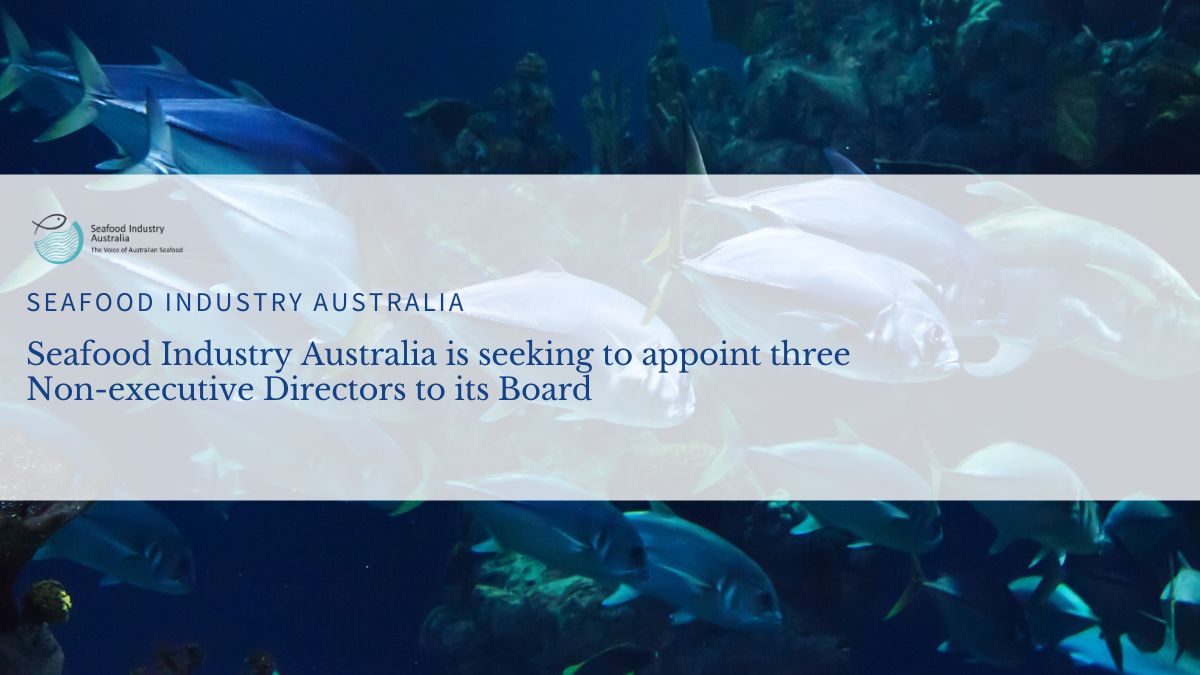
Seafood Industry Australia is seeking to appoint three Non-executive Directors to its Board
Click here to access the 2024 SIA Director Information pack.
Click here to access the 2024 SIA Director Nomination and Candidate Information Form.
About us
Seafood Industry Australia (SIA) is the national peak body representing the whole of Australia’s seafood industry with members from the wild-caught, aquaculture and post-harvest sectors.
As the voice of Australian seafood, SIA provides consumers, Government and other stakeholders with confident and united representation. We are a member-based, not-for-profit organisation with the mission to Promote, Protect and Develop the Australian seafood industry at a national and international level.
Overview
Seafood Industry Australia is seeking to appoint three (3) non-executive directors to its Board. These positions present a unique opportunity to support the direction of the association and the industry.
The SIA Board provides strategic guidance and effective oversight of the management and performance of the association in delivering its strategy. The Board operates under mature corporate governance and risk management frameworks to ensure the association’s efforts continue the prosperity of this important Australian industry.
Position Descriptions
The primary skill set sought for the 3 positions are as follows:
Position 1 – Governance & Stakeholder Management
— Experience and commitment to best practice corporate governance.
— Significant board expertise with an ability to guide the board around governance issues and processes.
— Previous Chair experience highly regarded but not essential.
— Possess an understanding of membership-based organisation governance with senior-level experience in successful stakeholder engagement strategy and implementation across key stakeholder groups.
— Awareness of regulatory and statutory frameworks.
Position 2 – Leadership and Strategy
— Experience in leading change and innovation in complex multi-stakeholder environments.
— Demonstrated track record as a Chair/Senior Executive with contemporary leadership experience.
— Entrepreneurial mindset.
— Experience in strategic/corporate planning, including identifying and analysing strategic opportunities and threats, developing, implementing, delivering and monitoring strategic objectives.
Position 3 – People & Culture
— Experience in overseeing workplace culture, people management, industrial relations, health, safety and wellbeing.
Contemporary skills in the following areas are also important but not essential assessment criteria:
- Financial literacy: Demonstrated financial management skills and ability to interpret and interrogate financial information.
- Digital and Technology: Experience and expertise in identifying, assessing, implementing and leveraging digital technologies, and understanding cyber-security.
- ESG Experience: Understanding and experience in effective environmental management and the impacts of climate change on business operations.
- Agribusiness Experience: Experience and knowledge of agricultural and food production, processing and marketing.
- Communication and Contribution: Be able to effectively communicate ideas to the board and contribute skills, knowledge and expertise to be an effective member of the board.
Directors commitment
Directors must be prepared to attend and participate in various meetings, including at least 4 Board meetings per year, the Annual General Meeting (AGM) and serve on board committees. Current committees of the Board include:
- Corporate Governance Committee
- Financial Audit and Risk Management Committee
- Director Nomination Committee
Previous experience as a Board Director and/or willingness to undertake relevant professional development is desirable. GAICD or similar credentials are highly regarded.
This is a volunteer position. Reimbursement will be provided for travel, accommodation and related expenses, in line with company policy. Board appointments are 3-year terms, currently with a maximum of 2 terms as per the existing Constitution.
Applications
SIA welcomes and encourages all suitably qualified candidates to apply. Candidates can specify the position they are applying for and can apply for multiple positions via the cover letter and/or the application form.
To express your interest, email your application and CV to [email protected] . Applications close Monday 8 July 2024.
SIA is committed to providing an environment that respects and promotes equality and diversity to better reflect their sector and the industry’s key markets.
SIA values the awareness, acknowledgement and respect for Aboriginal and Torres Strait Islander Peoples and their culture within our organisation. We welcome applications from people of Aboriginal and Torres Strait Islander heritage.
All applications will be treated with the strictest confidentiality.
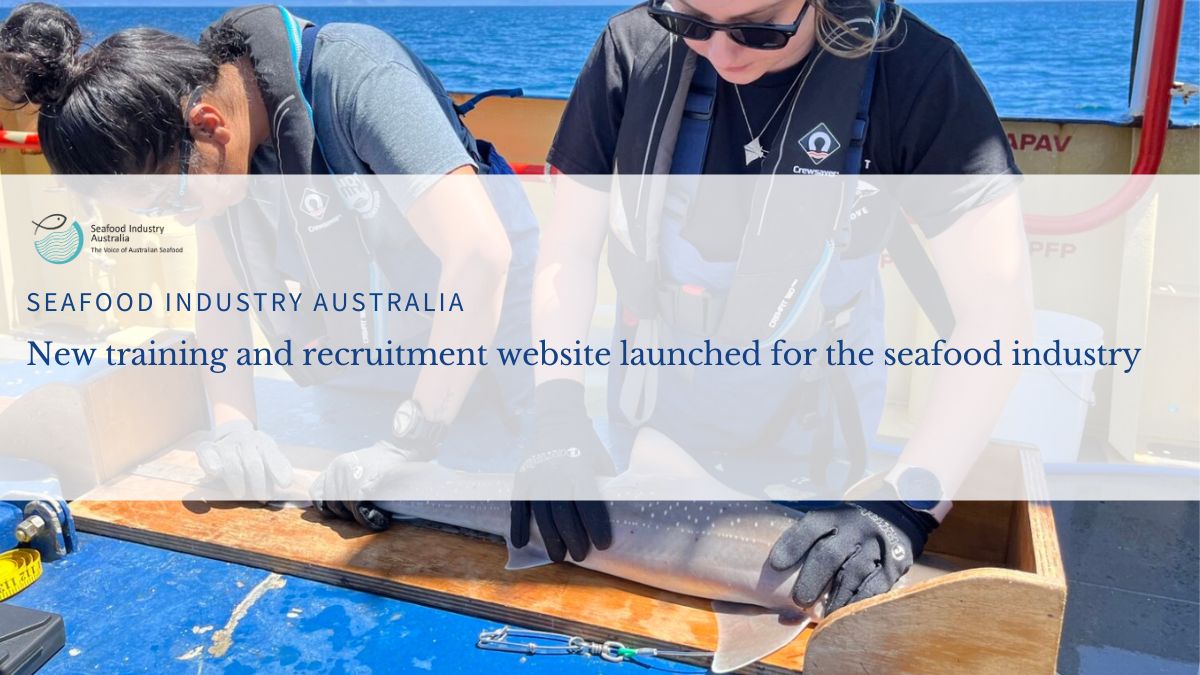
SIA launches new training and recruitment website for the seafood industry
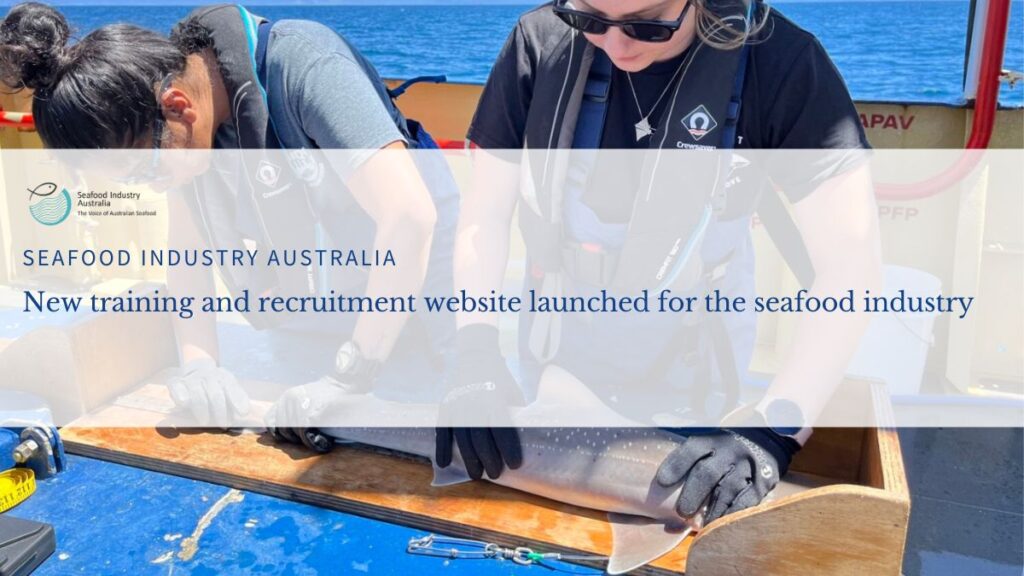
People are the Australian seafood industry’s most valuable asset and Seafood Industry Australia (SIA) and Fisheries Research and Development Corporation (FRDC) are excited to announce the launch of seafoodcareers.com.au, a training and recruitment website just for industry.
The Seafood Careers website serves as a central information hub for the Australian seafood industry showcasing the wide variety of ways to participate in industry and the available training. The site, created by employees for employees, aims to connect individuals with rewarding roles that contribute to sustainable, long term food security.
“The shortage of capable and experienced people within the seafood industry is an ongoing challenge for many commercial seafood producers,” stated Veronica Papacosta, Chief Executive Officer, Seafood Industry Australia. “Seafood Careers has been developed as a proactive step to address industry’s ongoing workforce shortages. We want to showcase the amazing opportunities our industry has to offer”.
“Seafood Careers is part of the Australian seafood industry’s goal to position ourselves as an industry known for its conscientious, fair, and progressive employers”.
Seafood Careers is designed to introduce, encourage and support people to participate in the Australian seafood industry by identifying opportunities to participate in the sector, career progression and training or mentoring opportunities.
The Australian seafood industry is committed to a vibrant and prosperous future, and by 2030 we believe the Australian fishing and aquaculture sectors can achieve $6 billion in annual gross value. This supports the Australian Government’s goal of growing Australian agriculture to $100 billion by 2030.
The growth of our industry delivers increased jobs and investment in all areas of Australia including the regional, rural and remote seafood communities where we typically operate.
The Australian seafood industry directly supports 17,000 families nationally.
“People participating in our industry help place more than 1.5 billion meals of the highest-quality, healthy and sustainable seafood on the table for Australian families and international customers every year” Ms. Papacosta said.
SIA would like to express sincere thanks to Seafood Careers sponsors, Austral Fisheries and Yumbah, for their support of this platform.
Seafood Careers has been developed with funding from the Australian Government Department of Agriculture Fisheries and Forestry (DAFF) and Fisheries Research and Development Corporation (FRDC). We thank those organisations for their support in developing Seafood Careers to help mitigate the impact of workforce shortages in our industry.
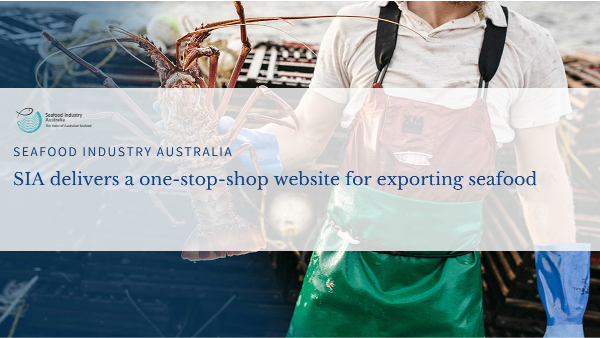
Introducing ExportingSeafood.com.au – the ultimate resource for seafood exporters
We are excited to announce the launch of exportingseafood.com.au, a comprehensive one-stop-shop curated for Australian seafood exporters. This innovative platform has been designed to provide seamless access to vital trade and market intelligence.
Recognising the unique challenges facing Australian seafood exporters, our goal is to provide the knowledge and resources needed to succeed in the global market. ExportingSeafood.com.au serves as a user-friendly and efficient online hub, consolidating information from various organisations into a single platform.
Key features include:
- Market Information: Key markets importing Australian seafood including a range of data, statistics, and specific information about exporting to that market.
- Product Specific Market Information: Key products exported from Australia and corresponding market reports for that species.
- Export Legislation: Legislation you need to comply with to export seafood from Australia.
- Export Documentation: A curated list of export documentation that applies to Australian seafood exporters.
- Seafood Safety: Disruptions in seafood trade are often a result of food safety issues, so it is important to have the right resources available.
- Grants and Loans: Explore opportunities for financial support to enhance your export initiatives.
- Marketing and Brand Resources: There are a number of resources available to seafood exporters to help you market your products and build an authentic international seafood brand.
- Training and Guidance: Access valuable training resources and guidance to enhance your exporting skills.exportingseafood.com.au is proudly delivered by Seafood Industry Australia and funded by the Agricultural Trade and Market Access Cooperation (ATMAC). This initiative reflects our commitment to supporting Australia’s seafood exporters in navigating the complexities of the global market.

